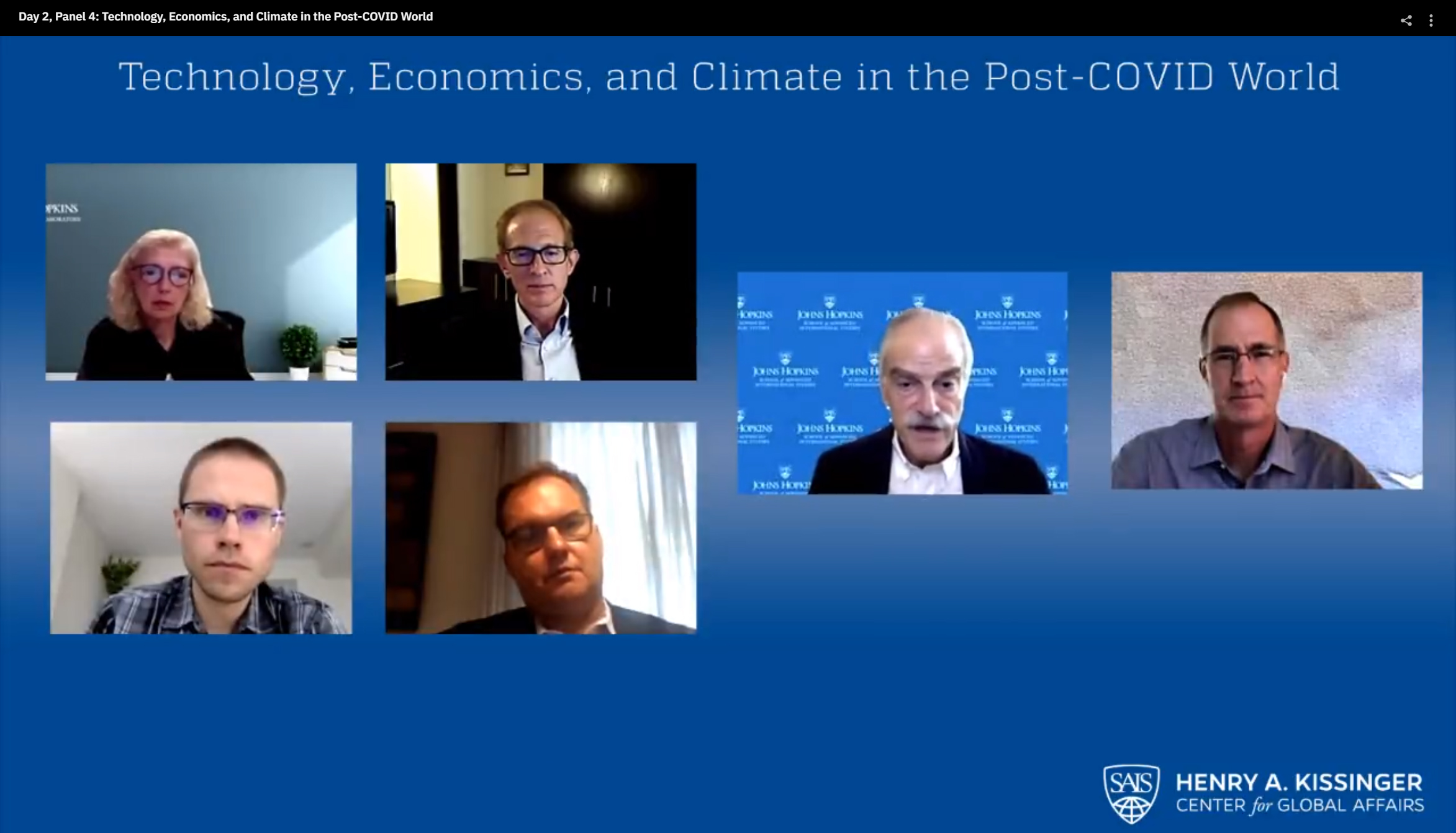Press Release
JHU and Johns Hopkins APL Thought Leaders Talk Technology in a Post-COVID World
The ongoing COVID-19 pandemic has not only dealt a crippling blow to global public health and the world economy; it has also threatened America’s standing as an international technology leader and could undermine democratic values worldwide. Turning things around “will require the U.S. government to develop and execute a planned and funded strategy for technology” that includes and connects partners from academia, industry and the international scientific community, said Johns Hopkins Applied Physics Laboratory (APL) Assistant Director for Policy and Analysis Christine Fox.
Fox was one of several cross-cutting thinkers from the Johns Hopkins enterprise who gathered June 30 and July 1 for the “World Order after COVID-19 Forum,” a virtual conference organized by the JHU School of Advanced International Studies and the Henry A. Kissinger Center for Global Affairs. Fox and APL national security analyst Thayer Scott appeared on a panel, “Technology, Economics, and Climate in the Post-COVID World,” moderated by APL Senior Fellow James Miller.
“We’ve been living in a globalized world now for the better part of three decades, and in that world, research, manufacturing and commodities … have known no geographic boundaries,” Fox noted. “National governments have mostly stayed out of the way, and many industries flourished financially, taking advantage of the vast global supply chain. Yet, even before the pandemic, the bloom was coming off the rose of globalization, particularly for the U.S. and China.”
COVID-19 is merely exacerbating this trend. The combination of current attitudes — within the United States and with an opportunistic China — could lead to a new digital version of the Cold War, Fox posited.
“In this world, the path chosen for technology would be accompanied by a correlating set of norms, and standards and practices, that are conducive to either democratic values or the authoritarian model,” she said. “To prevent such a scenario, the United States should focus on our strengths to offer the best alternative for technology and the most attractive model for governance.”
The panel asserted that authoritarian governments were already trying to control the information available to their people by censoring the internet. In fact, China recently announced plans to develop its own version of the internet.
“If successful, it will give them the ability to control the distribution of IP addresses and domain names for their people and will effectively splinter the internet … providing them the ability to control the information that flows over it,” Fox said. “This version of the internet may be more attractive to authoritarian regimes, and you could see a digital curtain dividing up much of the world into competitive and increasingly incompatible camps for information and communications.”
That decoupling is already underway in terms of 5G networks and hardware. China has made rapid progress in developing 5G networks, making many people — particularly in the U.S. government — uncomfortable, Scott noted. “But it’s also important to remember that China has significant, potentially show-stopping dependencies as well, most notable for the semiconductor chips that are needed in these 5G networks,” he said.
Companies in the U.S., Japan and the Netherlands lead the market for designing and producing the machines that make the chips. However, the software required to create this chip-making equipment is dominated by three American companies, giving the U.S. some power in the equation. Last month, the U.S. Department of Commerce restricted global chip makers using U.S. technology from supplying semiconductors to Chinese-owned telecommunications giant Huawei, a rule that covers virtually all builders of high-end chips.
This tug-of-war escalated in the wake of COVID-19, Scott said. “The scale of Chinese deception at the onset of the pandemic caused a number of European countries and allies to rethink prior decisions they’d made to deploy Huawei’s 5G in their countries,” he explained.
In the case of biotechnology, however, the dependencies run in the opposite direction, Fox noted. “The pandemic has revealed deep U.S. dependencies on China for key drugs, like antibiotics, and basic medical equipment, such as face masks and shields,” she said. “China is well aware of our dependencies in this area.”
Fox said the U.S. is working on restoring our capabilities to produce these drugs and protective equipment, but to get there will take direct government involvement, including billions of dollars and years of work.
“In the wake of COVID-19, China has stepped up, producing, exporting and even donating these supplies, and in doing so they are attempting to cultivate an image of a benevolent and responsible nation,” Fox said. These moves, viewed alongside China’s growing relationship with the “Belt and Road” countries that have accepted or partnered with China as part of that nation’s global and massive infrastructure development and investments strategy, raise alarm.
“Along with their medical assistance comes China’s 5G telecommunications infrastructure which, in the name of public health, allows governments to exercise more control over information and populations,” Fox explained.
The U.S. should view these issues as opportunities to produce alternatives that would perform comparably or better technologically while offering a more appealing, less totalitarian method of governance — and the U.S. should undertake direct involvement to do so, she added.
As much as American technology giants have accomplished, it’s not enough to let the commercial sector sort all of this out, Fox concluded. “With a strategic and effective international partnership, the U.S. can emerge from this pandemic in a position that sustains U.S. leadership and with it democratic values in a post-COVID-19 world.”
Playback of the two-day forum is available here. The content presented at the forum will become the basis for the book “COVID-19 and World Order: The Future of Conflict, Competition, and Cooperation,” to be published by Johns Hopkins University Press in the fall.
